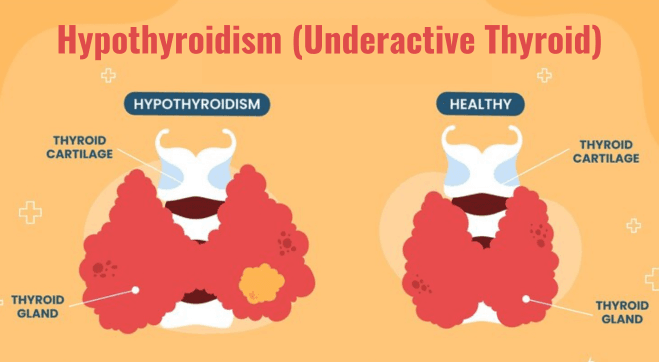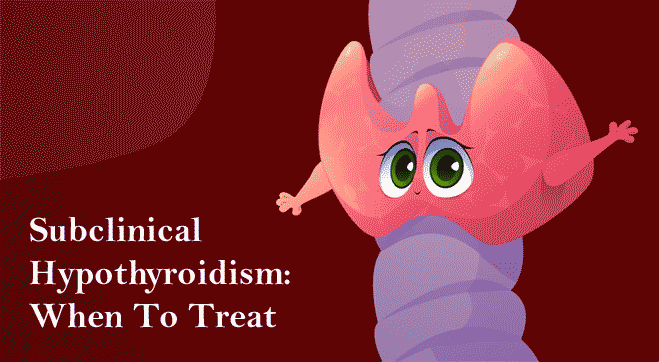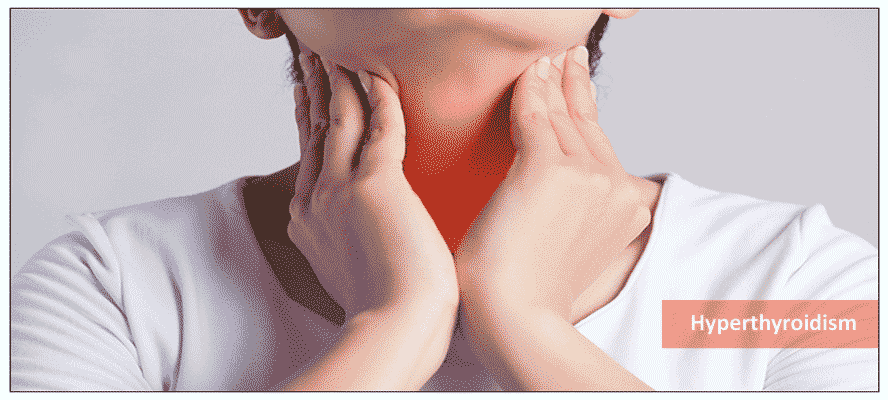What is Hypothyroidism (Underactive Thyroid)?
Hypothyroidism is an underactive thyroid and is a more frequent dysfunction or disorder of the thyroid. In Hypothyroidism (Underactive Thyroid) thyroid gland produces insufficient thyroid hormones. In this condition, the human body lacks the optimum level of the thyroid hormones triiodothyronine (T3) and thyroxine (T4). These hormones regulate vital body functions like metabolism, heart rate, body weight, body temperature, LDL- bad cholesterol levels, etc. A normal human body should have these hormones in an equilibrium state. Appropriate balance of T3 and T4 hormones is regulated by both the pituitary gland and hypothalamus, in coordination. [1]
The major role of the thyroid gland is to produce the two hormones T3 and T4, which require many resources, reactions, and events. When any of the requirements are not met, the gland fails to produce an adequate quantity of hormones. When the production of thyroid hormones falls below the body’s normal need, certain signs and symptoms are exhibited, and this cancer condition is called hypothyroidism.
Did you know:
- The prevalence of hypothyroidism (Underactive Thyroid) in India is approximately 11% and inland cities tend to have a higher prevalence compared to the coastal cities in India. [2] Hypothyroidism rates vary by location in India, with inland cities like Delhi and Bangalore showing a higher prevalence (11.73%) compared to coastal cities like Mumbai and Chennai (9.45%).
- Despite the nationwide adoption of universal salt iodization since 1983, the prevalence of hypothyroidism in India persists at elevated levels. [3]
When Does Hypothyroidism (Underactive Thyroid) Get Confirmed?
The National Institute of Diabetes and Digestive and Kidney Diseases (NIDDK), [4] Hypothyroidism is confirmed through blood testing, measuring thyroid-stimulating hormone (TSH), and thyroid hormones T-4 and T-3. A high TSH level with low T-4 indicates hypothyroidism, while high TSH with standard T-4 and T-3 levels suggests subclinical hypothyroidism, often without noticeable symptoms.
What are the Types of Hypothyroidism (Underactive Thyroid)?
Hypothyroidism is of the following types viz. Primary Hypothyroidism, Secondary Hypothyroidism, and Tertiary Hypothyroidism:
Primary hypothyroidism
In primary hypothyroidism, the thyroid gland doesn’t produce enough T4 and T3 hormones. This shows up with low T4 and T3 levels and higher TSH levels. The main cause is often an autoimmune condition called Hashimoto’s thyroiditis. It can make the thyroid gland larger (a goiter) or, later on, shrink and lose function.
Secondary hypothyroidism
Secondary hypothyroidism arises when the hypothalamus fails to produce enough thyrotropin-releasing hormone (TRH) or when the pituitary gland produces insufficient thyroid-stimulating hormone (TSH). In some cases, the term tertiary hypothyroidism is used when deficient TRH secretion leads to insufficient TSH secretion.
Tertiary Hypothyroidism
Tertiary hypothyroidism is an uncommon condition characterized by a malfunction in the hypothalamus, leading to insufficient production of thyrotropin-releasing hormone (TRH). This disruption, in turn, impacts the pituitary gland’s ability to produce thyroid-stimulating hormone (TSH).
Beyond these categories, there are other distinct forms of hypothyroidism. One example is congenital hypothyroidism, which can either be temporary or lifelong. Another variation is subclinical hypothyroidism, identified by increased serum TSH in individuals showing few or no symptoms of hypothyroidism, alongside normal serum levels of free thyroxine (T4).
What is the Difference Between Hypothyroidism and Hyperthyroidism?
The key differences between hypothyroidism vs hyperthyroidism include: [5]
|
Hypothyroidism |
Hyperthyroidism |
|
A medical condition characterized by inadequate production of hormones by the thyroid gland |
A medical condition characterized by an excessive production of thyroxine (T3) and triiodothyronine (T4) hormones by the thyroid gland |
|
Otherwise known as underactive thyroid |
Otherwise known as overactive thyroid |
|
Symptoms include slower metabolism, fatigue, and weight gain |
Symptoms include excessive bursts of energy, weight loss, and feelings of anxiety |
|
Key causes include Thyroiditis, Congenital hypothyroidism, and iodine deficiency |
Key causes include Graves disease, Thyroiditis, excess consumption of thyroid hormone, and noncancerous growths in the thyroid or pituitary gland |
|
Complications include cardiovascular disorders, goiter, nerve injury, peripheral neuropathy, carpal tunnel syndrome, declined kidney function, obstructive sleep apnea, joint pain, balance issues, infertility, etc. |
Complications include cardiovascular disorders, bone thinning, osteoporosis, fertility problems in women, premature birth, high BP during pregnancy, miscarriages, etc. |
|
Key treatment/management methods include medications to meet the hormone production gap |
Key treatment/management methods include medications, radioiodine therapy, and surgery |
Hypothyroidism Causes
Hypothyroidism is generally more common in people who are already suffering from autoimmune disorders. One of the possible causes is the presence of high-fat cell deposition in the body, which produces leptin that leads to increased production of TSH. Elevated TSH levels in the blood indicate less amount of thyroid hormones because of poor working of the thyroid gland.
Some of the common hypothyroidism causes are explained below:
Autoimmune Thyroid Disease (Hashimoto’s Thyroiditis)
This is an autoimmune disorder of the thyroid gland. It is the most common cause of underactive thyroid. In this condition, the thyroid cells are identified as foreign by the body and thus are under constant attack by the immune system. Autoimmune thyroiditis can begin suddenly or it can develop slowly over years with higher incidence occurring in women of childbearing age.
Thyroidectomy or Radiation Therapy
Radiation is used for the treatment of overactive thyroid or thyroid cancer. Thyroidectomy is a surgical procedure used to remove some part or all of the gland. Goiter, which is a condition of enlargement of the thyroid gland can be treated by thyroidectomy. Thyroidectomy slows down or inhibits the production of thyroid hormones. The after-effects of radiation therapy on thyroid hormones might develop gradually without apparent signs and symptoms until several years.
Severe Iodine Deficiency
Iodine deficiency is the most common cause of primary hypothyroidism [6]. The trace element iodine is required by the body for making thyroid hormones. The iodide taken up by the thyroid gland eventually oxidizes to iodine with the help of the enzyme thyroid peroxidase. The iodine goes through a series of reactions within the thyroid gland to produce thyroxine (T4) and triiodothyronine (T3).
Central Hypothyroidism
Central hypothyroidism is caused due to insufficient thyroid gland stimulation by thyroid stimulating hormone (TSH), occurring from the pituitary gland or hypothalamus dysfunction. Both these glands produce hormones that influence thyroid hormone production and play a part in the central nervous system.
Secondary causes of hypothyroidism
- Surgical removal of the thyroid gland either for hyperthyroidism or thyroid cancer
- Deficiency in dietary iodine consumption
- Congenital Hypothyroidism
- Thyroiditis – An inflammatory condition that leads to the leakage of thyroid hormones out of the thyroid gland. Subacute Thyroiditis, Postpartum Thyroiditis, and Silent Thyroiditis are the three common types of Thyroiditis that lead to an underactive thyroid.
- Medications for heart and bipolar diseases as well as certain cancers might also cause hypothyroidism symptoms.
Apart from these Hypothyroidism causes, there are other risk factors that raise your chances of developing an underactive thyroid condition. These include:
- A past history of goiter
- A family history of thyroid disorders
- Turner syndrome – mostly found in women
- Celiac disease
- Sjögren’s syndrome
- Pernicious Anaemia
- Type 1 Diabetes or Type 2 Diabetes
- Rheumatoid Arthritis
- Lupus
Signs and Symptoms of Hypothyroidism (Underactive Thyroid)
The nature and severity of the hypothyroidism symptoms vary from person to person. They are also dependent on the amount of decrease in thyroid hormones and the duration of time it has been present. For most patients, the symptoms are mild and can often be confused with other problems such as the natural aging process, menopause, and stress. This is why many patients remain undiagnosed and untreated for years.
The signs of hypothyroidism may include a few or many of the following:
- Fatigue, muscle swelling, or cramps
- Tingling in the fingers
- Loss of equilibrium
- Thyroid Weight gain
- Dry skin and cold intolerance
- Yellow skin
- Constipation
- Depression
- Goiter (enlarged thyroid causing a lump in the neck)
- Decreased concentration
- Infertility or miscarriages
- Myxedema fluid infiltration of tissues causing puffiness (mainly on the face)
Though the hypothyroidism symptoms in females and the hypothyroidism symptoms in males are almost similar, these symptoms may vary in infants, children, and teens.
Signs and symptoms of Hypothyroidism in Infants
Signs and symptoms of Hypothyroidism in infants are: [7]
- Poor growth and weight gain
- Poor muscle tone
- Jaundice
- Dry skin
- Hoarse crying
- Feeding problems
- Umbilical Hernia
Signs of Hypothyroidism in Children and Teens
Signs of Hypothyroidism in children and teens include: [8]
- Short stature due to poor growth
- Delayed development of permanent teeth
- Delayed puberty
- Inadequate mental development
Complications of Hypothyroidism (Underactive Thyroid)
Untreated hypothyroidism may lead to various complications. Cardiovascular issues, such as elevated cholesterol levels and heart disease are the most common complications. Mental health challenges like depression and cognitive issues may arise. Hypothyroidism may also impact fertility and contribute to menstrual irregularities in women. Severe cases may lead to a rare condition called myxedema, causing extreme fatigue, unconsciousness, and even coma. Regular monitoring, appropriate medication, and lifestyle adjustments are essential to prevent and manage these complications of hypothyroidism, highlighting the importance of timely diagnosis and treatment for individuals with hypothyroidism.
Diagnostic Evaluation of Hypothyroidism (Underactive Thyroid)
The key measures for diagnostic evaluation of Hypothyroidism include: [9]
- An analysis of the patient’s medical history
- Physical examination
- Thyroid profile tests, such as
- Imaging Tests
Hypothyroidism Treatment
Hypothyroidism treatment usually includes medical management of hypothyroidism as well as home remedies for hypothyroidism that includes making lifestyle changes.
Synthetic Thyroxine
The standard treatment for hypothyroidism typically involves the use of levothyroxine, a hormone replacement tablet that compensates for the insufficient production of thyroxine by the thyroid gland. Determining the correct levothyroxine dosage is an iterative process guided by regular blood tests until the optimal dose is identified. Once established, annual blood tests are usually conducted to monitor hormone levels. This lifelong treatment may require dosage adjustments over time, necessitating continuous monitoring. [10]
Proper administration of levothyroxine is crucial, preferably on an empty stomach and at the same time daily[11]. It should not be skipped or discontinued without consulting a healthcare professional, as abrupt cessation may lead to the gradual recurrence of hypothyroid symptoms.
Rarely, high-dose thyroid replacement therapy aimed at suppressing thyroid-stimulating hormone (TSH) may be advised. However, this approach carries potential risks of adverse effects, including atrial fibrillation, strokes, osteoporosis, and fractures.[12]
For individuals with Hashimoto’s disease or other autoimmune thyroid disorders, sensitivity to harmful side effects from iodine may be a concern. Consulting with a healthcare provider is crucial to determine which foods, supplements, and medications to avoid in such cases.
Common Queries
- How long does it take for levothyroxine to start working?
Although levothyroxine begins to act immediately, it may take many weeks for individuals to feel an improvement in their symptoms. Regular monitoring and adherence to the specified dosage are required for optimal hypothyroidism management.
- Are there any side effects of levothyroxine?
Commonly reported effects encompass increased appetite, weight loss, heat sensitivity, excessive sweating, headaches, hyperactivity, nervousness, anxiety, irritability, mood swings, trouble sleeping, tiredness, tremors, muscle weakness, and alterations in menstrual periods. Additionally, less frequent but potentially more severe side effects may manifest, such as chest pain, difficulty breathing, heat intolerance, hives, irregular heartbeat, irritability, nausea, and unusual tiredness or weakness.
Other Common Hypothyroidism Treatment Methods include:
- Lifestyle Modifications: Healthy lifestyle changes, including a balanced diet and regular exercise, support overall well-being.
- Regular Monitoring: Thyroid function is regularly assessed to adjust medication dosage as needed.
- Avoidance of Certain Foods: Some foods, such as soy and Cruciferous vegetables, Fatty foods, Sugary foods, Processed foods, Gluten, and dairy may interfere with levothyroxine absorption and should be consumed at least four hours apart from medication.
Home Remedies for Hypothyroidism (Underactive Thyroid)
- Balanced Diet: The inclusion of iodine, selenium, and zinc supports thyroid function. [13]
- Regular Exercise: Combats weight gain and enhances overall well-being.
- Stress Management: Techniques like yoga and meditation contribute to hormonal balance.
- Essential Lifestyle Factors: Adequate sleep and hydration are crucial elements.
- Herbal Remedies: Certain herbs, such as ashwagandha [14] and guggul, are believed to have thyroid-supportive properties. Efficacy varies, and consultation with a healthcare professional is vital.
Home remedies should complement, not replace, medical intervention. Consultation with a healthcare professional is crucial before relying solely on home remedies for managing hypothyroidism.
Prevention of Hypothyroidism (Underactive Thyroid)
While some causes of hypothyroidism are beyond control, preventive measures can mitigate risk. Ensuring an adequate intake of iodine through a balanced diet, including iodized salt, seafood, and dairy products, is crucial. Selenium-rich foods like Brazil nuts and whole grains also support thyroid health. Avoiding excessive soy consumption and maintaining a diet with sufficient nutrients aids prevention. Opting for Regular medical health checkup packages enable early detection and intervention. Minimizing exposure to environmental factors such as certain medications and radiation is prudent. A healthy lifestyle with balanced nutrition, regular exercise, and stress management contributes to overall well-being, potentially reducing the risk of developing hypothyroidism.
Hypothyroidism-Friendly Diet
While there is no one-size-fits-all best diet for hypothyroidism (Underactive Thyroid), some dietary principles may support thyroid health:
- Iodine-rich foods: Include iodine sources like iodized salt, seafood, and dairy, as iodine is essential for thyroid hormone production.
- Selenium-rich foods: Brazil nuts, sunflower seeds, and whole grains provide selenium, which supports thyroid function.
- Balanced Nutrition: Ensure a well-rounded diet with fruits, vegetables, lean proteins, and whole grains for essential nutrients.
- Limit Goitrogenic Foods: Some foods, like soy, cruciferous vegetables (cabbage, broccoli), and certain fruits, may interfere with thyroid function when consumed excessively. Adequate Hydration: Water is crucial for overall health, including thyroid function.
A Note from HealthcareOnTime
Hypothyroidism (Underactive Thyroid) is a common endocrine disorder characterized by an underactive thyroid gland, leading to a myriad of symptoms that affect metabolism, energy levels, and overall well-being. While more prevalent in women, it can also impact men. Timely diagnosis through blood tests and subsequent treatment with hormone replacement therapy, typically levothyroxine, is essential for managing symptoms and preventing complications. Regular monitoring, adherence to medication, and lifestyle adjustments, such as a balanced diet and exercise, play important roles in successful management. Recognizing the signs, seeking medical attention, and maintaining a proactive approach is key to promoting optimal thyroid health and ensuring a better quality of life for individuals affected by hypothyroidism.
Disclaimer
The information listed here is strictly for educational purposes and is not intended to offer personal medical advice. Do consult your physician for any questions you may have regarding a medical condition. It’s not advised to disregard professional medical advice or delay in seeking it because of any information listed here. The Nutrition Source does not recommend or endorse any products.
Sources
Ref Links:
- Thyroid Hormone- Cleveland clinic
- Prevalence of hypothyroidism in adults- NCBI
- Thyroid Function – Frontiers
- Hypothyroidism vs. hyperthyroidism- MedlinePlus
- Hypothyroidism- NCBI
- Neonatal hypothyroidism- MedlinePlus
- Hypothyroidism (underactive thyroid)- MayoClinic
- Underactive thyroid Diagnosis – NHS
- Underactive thyroid Treatment- NHS
- Meta-analysis of TSH- NCBI
- Thyroid hormone levels- NCBI
- Thyroid Function and Disorders – Ingentaconnect
- Subclinical Hypothyroid Patients- Liebertpub
- The Nutrition Source- Harvard
- Are Goitrogens in Foods Harmful- Healthline










